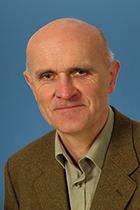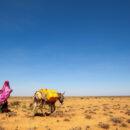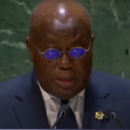Stephen Ellis: An Appreciation – By Lansana Gberie

 The loss of Professor Stephen Ellis on 29 July 2015 at 62, after a battle with the debilitating leukaemia which he bore with stoicism and good humour, was to me a personal one. He was a great friend and a mentor. I am told by a mutual friend that Stephen greeted his diagnosis three years ago with the remark, “at least I won’t get Alzheimer’s now…”
The loss of Professor Stephen Ellis on 29 July 2015 at 62, after a battle with the debilitating leukaemia which he bore with stoicism and good humour, was to me a personal one. He was a great friend and a mentor. I am told by a mutual friend that Stephen greeted his diagnosis three years ago with the remark, “at least I won’t get Alzheimer’s now…”
I last saw him in Dakar, Senegal, at the launch of the West Africa Commission on Drugs report, “Not for Transit: Drugs, State and Society in West Africa”, in June 2014. Through his encouragement and support, I had co-authored the report (with Camino Kavanagh), producing the first draft of it and seeing it through its final publication. In Dakar, he showed no indication that he was battling the demoralising and ultimately fatal leukaemia.
He and I shared the same lunch table with former Nigerian President Olusegun Obasanjo, who was entertaining and funny; and later, as I rushed to join Camino to pose for photographs with Kofi Annan, Stephen mocked me (he thought that with my open neck shirt and dark jacket, and my broad smile, I looked like an American rap artist he knew).
His conviviality during the Dakar event adds, to me, an extra, retrospective gloss on his courage and dedication to Africa: he continued his engagement with the continent throughout his ailment, contributing to debates and research about it with his customary thoroughness, lucidity, and penetration.
I am grateful to him for many things, including two (for me) life-defining projects which could not have been realized without his crucial intervention and contribution: my 2005 book, ‘A Dirty War in West Africa: the RUF and the Destruction of Sierra Leone‘, which he inspired and supported; and my PhD which he critically promoted throughout its realisation.
He encouraged me in 2006 to take up a Visiting Fellowship at the African Studies Center at the University of Leiden. I had a most enjoyable and productive time there.
Professor Ellis was, in my judgment, by far the most accomplished, productive and dedicated scholar of Africa of his generation, and his contribution will remain the gold standard with respect to modern scholarship on Africa. I particularly value his works on Liberia, religion in Africa, drug trafficking and organized crime in West Africa, and his recent book on the African National Congress in exile.
His “˜External Mission: the ANC in exile, 1960-1990‘ (2013) generated wide discussion and controversy. The book documented some of the darker aspects of the ANC’s struggle against the evil apartheid system, and was critical of its leadership, including of Nelson Mandela.
Some of the reaction to the book was hysterical, others reasoned, but all pay tribute to Stephen’s capacity to generate path-breaking and provocative research. This reaction somewhat mirrored the reaction to Stephen’s book on Liberia, “˜The Mask of Anarchy: the destruction of Liberia and the religious dimension of an African civil war‘ (2001).
Some critics picked on aspects of ritual cannibalism during the civil war that Stephen documented, to charge the author with having a malicious attitude towards Africa. None of them commented when testimonies by Liberians before Liberia’s Truth and Reconciliation Commission and the Special Court for Sierra Leone in 2008 and 2009 brought out even more graphic details of this atrocity.
Stephen was rightly unfazed: it is best to ignore people who substitute irritation for concern, and pious outrage for solid evidence.
Although trained as a historian at Oxford, and clearly the most consistently insightful and productive scholar of Africa of his generation, Stephen took journalism very seriously. He had been for five years editor of the authoritative specialist newsletter Africa Confidential, and he had the journalist’s flair for the telling detail and anecdote.
I suspect that he acquired some of his strongest virtues – clarity of writing and a rigorously dispassionate reasonableness – from his practice of journalism. He also took African journalists and their work very seriously, unlike many other scholars.
He used African newspapers extensively as primary sources, and was on very friendly terms with many journalists across Africa. He always knew someone to talk to in every African country, contacts from which I benefitted.
I will miss him deeply. He was often my first reader, always with helpful critical comments and suggestions. As part of a work-in-progress, I came across some intriguing documents last year and emailed Stephen about them. He immediately wrote back, “This is very interesting, and of great potential importance… Do you think you can write anything based on this archival material? Will you consider writing an article from this [for a start]? It would be great if you could.”
I preferred to keep the materials exclusively for a book that I am writing, and Stephen agreed. It is impossible for me to describe fully how insupportable his loss is to me, but I should now be reconciled to it.
Rest in Peace, Stephen.
Dr. Lansana Gberie is a specialist on African peace and security issues. He is the author of A Dirty War in West Africa: The RUF and the Destruction of Sierra Leone (Indiana University Press 2005).






moving stuff, Lans. but one could never expect anything less anyway…